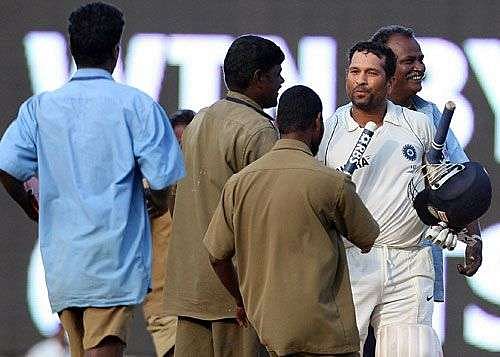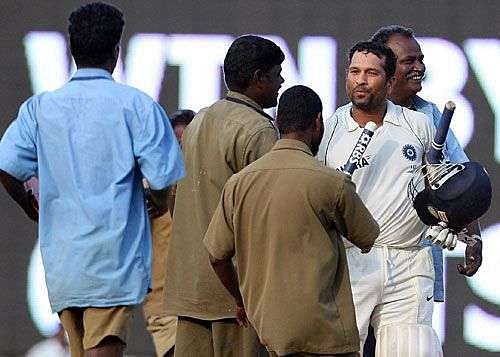
"It was a healing process" - Steve Harmison on why he didn't mind losing to India in 2008

Steve Harmison’s worries had, not for the first time, centred on his England one-day career as he lay on his hotel bed in Bangalore. Coming out of retirement with a promise of a place in the team, he had once again found himself sidelined.
Then, however, word came round of a series of sickening terror attacks in Mumbai. Switching the TV on, Harmison could barely believe the horror laid before him. “Me, Andrew Flintoff, and Kevin Pietersen were watching the terrible events unfold,” he recalls. “It was a scene of utter carnage and chaos. There were bodies lying in the road in front of the famous Taj Palace hotel, and the building itself was ablaze.
“Gunshots could be heard as the terrorists went through the rooms killing guests. ‘Chilling’ doesn’t even begin to describe it – this was the same hotel we’d stayed in two weeks before. Those rooms where people were being slain as they cowered in corners were the same ones we’d stayed in.
“I could imagine in my head where people, desperate, terrified, would be trying to hide. I could see the layout – bed, wardrobe, bathroom, shower. Someone was in there now, either already dead or trying to hide themselves, their family, their children, and realising the hopelessness of the situation. The gunmen had rampaged through the restaurants where we’d eaten and set fire to the gym where we trained. People we knew – the manager, chefs, all kinds of people, would undoubtedly be dead. What had happened to the staff who’d served us when we were up on the roof in the bar having a drink and something to eat? We were getting word that the big tall chef in the Japanese restaurant we liked, who would cook our dinner in front of us, was dead.
All across Mumbai, terrorists were killing people with random brutality. I felt sick. We all did. We couldn’t move from in front of the TV for the sheer shock of it all.”
With the security situation so tense, Harmison thought the tour would be cancelled and the team flown home as a matter of emergency. But, he says, the England Cricket Board had other ideas.
“The message coming from the top brass was that the tour should go on, otherwise they would be liable to a compensation claim from the Indians. If anything epitomises the gulf between the suits at Lord’s and the players, it is that. Unbelievable. We were high profile targets, and all they could think about was money.”
Eventually, the players flew home, and then on to a holding camp in Abu Dhabi before the first Test in Chennai - the two Tests were moved from Ahmedabad and Mumbai to Chennai and Mohali, then - Captain Kevin Pietersen reiterating that a decision on whether to return to India would be left down to individuals.
“There was a lot of whispering in the group,” recalls Harmison.
“’Are you going to go?’ I put my trust in Reg Dickinson, our security expert, who was still in India finding out what was happening.
“When he came to Abu Dhabi, I had a good chat with him on my own. I asked him outright, ‘Is it all right to be going back?’ When he looked me in the eyes and said, ‘Yes, it’ll be fine,’, that’s all I needed to hear. I trusted Reg implicitly. From that point on, it was a simple decision for me – we go.
But I didn’t want my decision to influence others because at the time I was a very senior player. I didn’t want to cloud the decisions of Cook, Prior, and some of the other younger ones who did have a rabbit in the headlights look about them. I kept schtum and let them make their own minds up.”
KP was always going back. Leading by example was one reason, the IPL another. He knew India would be a big part of his future and wanted to show them some loyalty.
“It was scary going back,” he continues, “but India is cricket crazy and we felt that if we didn’t go back, the misery and the mourning would just go on a little bit longer. We knew that going back would be good for them, almost part of the healing process.”
India would famously win the game, with Sachin Tendulkar reaching a magnificent century as he hit the winning runs. In a country riven with pain, it was a deeply poignant moment of remembrance and celebration.
“It’s for that reason,” notes Harmison, “that the defeat in Chennai was the only Test loss in my career that I wasn’t massively bothered about. I’m not sure even a scriptwriter could have come up with what happened - Sachin Tendulkar, the great Indian hero, walking off having hit a hundred and the winning runs at the same time.
“He was in tears thanking us in the dressing room. What it meant to him, the great son of Mumbai was everything, and that’s why he was so grateful we’d gone back. It was like it was written in the stars that it should pan out like that.
For him to come into our dressing room and thank us was very moving, very humbling. There was a lump in the throat to see one of the greatest players of all time like that. He’d just taken a hundred off us and his team had beaten us and now he was in our dressing-room thanking us.
It was nothing in the grand scheme of things, but it was something for them to celebrate, be happy about.
That was more than a game of cricket, it was a healing process. I left Chennai feeling proud to have played in that game.”
* SpeedDemons, by Steve Harmison, with John Woodhouse, is now available on Amazon.
John Woodhouse is a TV critic, @Sentinel writer, penned biggest selling cricket book of 2016 with @gfoxyfowler, now working with Steve Harmison. @BBCRadioStoke and @BBCRadioManc